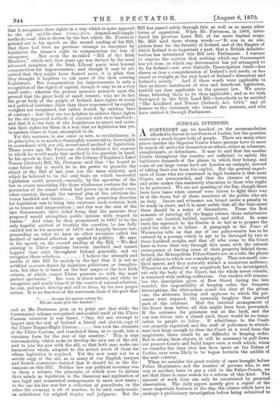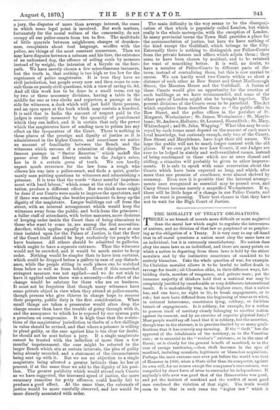JUDICIAL INTERIORS.
FORTNIGHT ago we touched on the accommodation
afforded to Jurors in our Courts of Justice, but the question concerns a much larger body of people. There are many other places besides the Superior Courts where persons have to meet in search ofj ustice for themselves or others, either as witnesses, complainants, or defendants. It may be said that the smaller Courts throughout the country are sufficient to satisfy the legitimate demands of the places to which they belong, and some of our large towns have set London an example, instead of taking their cue from the capital. But the general experi- ence of those who are concerned in legal business is that most Courts are overcrowded, and that the absence of system and order makes this eminently obnoxious to those who ought to be protected. We are not speaking of the Bar, though there have been times when counsel were driven to fight their way in at the doors, but of those members of the public who are on duty. Jurors and witnesses are bound under a penalty to be ready in court, and it is most unfair that all the time spent there should be a series of discomforts. From the first moment of entering till the happy release, these unfortunate people are hustled, bullied, squeezed, and stifled. In some cases the approach to the Courts is so bad as to prepare the mind for what is to follow. A paragraph in the Times of Wednesday tells us that one of our police-courts has to be entered by a passage which is apt to be thronged by two or three hundred roughs, and that all who come to the Court have to force their way through this mass, with the natural consequence of leaving some of their property behind them. Indeed, the Metropolitan Police-Courts are, as a rule, the places of all others to which our remarks apply. They are small, con- fined spaces, and they naturally attract a numerous audience. Whenever an offence of any magnitude has to be investigated, not only the body of the Court, but the whole street outside, is crammed with reeking ruffianism. Our readers will remem- ber the description given of Bow Street during the late scandal, the impossibility of keeping order, the frequent interruptions, the obstruction round the door of the prison van, the alternate hissing and applause to which the pri- soners were exposed, the unseemly laughter that greeted part of the evidence. Had the internal arrangement of the Court been better, all this might have been prevented. If the entrance for prisoners was at the back, and the van was driven into a closed yard, there would be no temp- tation to people to loiter. If admittance to the Court was properly regulated, and the staff of policemen in attend- ance was large enough to clear the Court at a word from the magistrate, there would be no difficulty in keeping order. But to attain these objects, it will be necessary to pull down our present Courts and build larger ones, a work which, when we consider the time that has been spent on the Palace of Justice, may seem likely to be begun towards the middle of the next century.
When we consider the great variety of cases brought before Police Magistrates, and the number of persons who, in one way or another, have to pay a visit to the Police-Courts, we see that there is some reason for a reform of this kind. The amount of work done can only be ascertained by personal observation. The daily papers merely give a report of the more important business of the day, the crimes which have to undergo a preliminary investigation before being submitted to a jury, the disputes of more than average interest, the cases in which some legal point is involved. But such matters, fortunately for the moral welfare of the community, do not occupy all our police-courts from ten to five. The multitude of little quarrels between neighbours, charges of drunken- ness, complaints about foul language, scuffles with the police, are things of the most constant occurrence. Then we may have disputes between a cabman and his fare, the existence of an unlicensed dog, the offence of selling coals by measure instead of by weight, the intrusion of a bicycle on the foot- path. We have merely chosen a few miscellaneous instances, but the truth is, that nothing is too high or too low for the cognizance of police magistrates. It is true they have no civil jurisdiction, but people every now and then come to con- sult them on purely civil questions, with a view of saving Gs. 8d. And all this work has to be done in a small room, cut up by two or three necessary divisions, having a table in the middle for one or two clerks and reporters, a passage at the side for witnesses, a dock which will just hold three persons, and an open space at the back which may contain a hundred. It is said that in India the amount of respect paid to the judges is exactly measured by the quantity of punishment which they can inflict, and it is certain that only the power which the magistrates have of sending men to prison has any effect on the frequenters of the Court. There is nothing in these places of the prestige and dignity of justice as it is administered in the higher Courts, and sometimes we notice an amount of familiarity between the Bench and the witnesses which savours of a relaxation of discipline. The famous passage in " Sartor Resartus " which make 1 the power over life and liberty reside in the Judge's robes, has in it a certain germ of truth. We can hardly expect much reverence for the law from a rough who elbows his way into a police-court, and finds a quiet, gentle- manly man putting questions to witnesses and admonishing a prisoner. It is true that the words "three months' imprison- ment with hard labour," which come at the end of the exhor- tation, produce a different effect. But we think more might be done if our Courts were made to impress the spectators, and if there was something else besides punishment to keep up the dignity of the magistrate. Larger buildings cut off from the street, with an internal arrangement which would keep the witnesses away from the public, and both from the prisoners ; a fuller staff of attendants, with better manners, more desirous of keeping order inside the Court than of being obnoxious to those who want to come in, are among the first necessities. Another, which applies equally to all Courts, and was at one time insisted upon for the Palace of Justice, is that the floor of the Court itself should be kept exclusively for people who have business. All others should be admitted to galleries, which ought to have a separate entrance. Thus the witnesses would not be crowded, and it would be much easier to keep order. Nothing would be simpler than to have iron curtains, which could be dropped before a gallery in case of any disturb- ance, while the people sitting in such places can be watched from below as well as from behind. Even if this somewhat stringent measure was not applied—and we do not wish to have it applied unless there was a necessity—the effect of the change would be salutary for those who are on business. It must not be forgotten that though many witnesses have some private object in view when they attend at police-courts, though persons who give thieves in charge hope to recover their property, public duty is the first consideration. When small things are taken a prosecutor would often drop the charge sooner than have the trouble of going through with it, and the annoyance to which he is exposed by our system puts a premium on compromise. It is high time that the restric- tions of the magistrates' jurisdiction to thefts of a few shillings in value should be revised, and that where a prisoner is willing to plead guilty, or the case against him is too clear for doubt, he should not be sent before a jury. If a single magistrate cannot be trusted with the infliction of more than a few months' imprisonment, the case might be referred to the larger Bench which sits at certain intervals, the plea of guilty being already recorded, and a statement of the circumstances being sent up with it. But we see no objection to a single magistrate being allowed a greater latitude than he has at present, if at the same time we add to the dignity of his posi- tion. The greater publicity which would attend such Courts as we have suggested, the increased speed of justice, the more summary remedies for petty offences, could hardly fail to produce a good effect. At the same time, the externals of justice would be more carefully observed, and law would be more directly associated with order. The main difficulty in the way seems to be the disorgani- zation of that which is popularly called London, but which really is the whole metropolis, with the exception of London. In many provincial towns the Town Hall provides a place for the accommodation of justice, but here we have nothing of the kind except the Guildhall, which belongs to the City. Externally there is nothing to distinguish our Police-Courts from the private houses and offices which adjoin them ; they seem to have been chosen by accident, and to be retained for want of something better. It is well, no doubt, to have a number of Police-Courts in different parts of the town, instead of centralizing them, but this is now carried to ' excess. We can hardly need two Courts within so short a distance of each other as Bow Street and Great Marlborough Street, the Mansion House and the Guildhall. A fusion of these Courts would give an opportunity for the erection of such buildings as we have recommended, and some of the other parts of London might also be brought together, The present divisions of the Courts seem to be parochial. The Act which regulates them describes them as "the public office in Bow Street, and the police offices in the parishes of St. Margaret, Westminster ; St. James, Westminster ; St. Maryle- bone ; St. Andrew, Holborn ; St. Leonard, Shoreditch ; St. Mary, Whitechapel ; and St. John, Wapping." What idea may be con- veyed by such terms must depend on the amount of each man's local knowledge, but curiously enough, only two of the Courts, Bow Street and Marylebone, have kept their old names. We hope the public will not be much longer content with the old places. If we ever get the new Law Courts, if our Judges are ever to be lodged in stately and well-ventilated rooms, instead of being condemned to those which are at once dismal and stifling, a stimulus will probably be given to other improve- ments. It is safe to speak with some reservation about the Courts which have been expected so long, and which, after more than one promise of excellence, were almost shelved by economy. Even now it is possible that the internal arrange- ments once recognized as essential may be passed over, and Carey Street become merely a magnified Westminster. If so, there will be little hope of a change in our Police Courts, and yet the want is pressing. Their best chance is that they have not to wait for the High Court of Justice.































 Previous page
Previous page